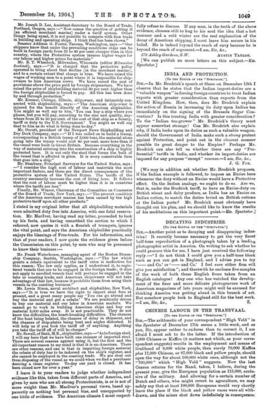lTo THE EDITOE OE THE "SPECTATOR. "] SIR,—In Mr. Brodrick's speech
at Shere on December 13th I observe that he states that the Indian import-duties are a " valuable weapon " in forcing foreign countries to treat Indian exports with greater consideration than exports from the United Kingdom. How, then, does Mr. Brodrick explain the action of Russia in increasing its duty upon Indian tea immediately on the signing of the Brussels Sugar Con- vention? Is this treating India with greater consideration ? To the " Indian tea-grower " Mr. Brodrick's theory must appear somewhat strange ! Can Mr. Brodrick also explain why, if India looks upon its duties as such a valuable weapon, should the Government of India make such a strong protest against Protection, and point out in the clearest manner possible its great danger to the Empire ? Perhaps Mr. Brodrick can also tell us whether there are any "Pre- ferential " tariffs in India, and whether its import-duties are imposed for any purpose " except " revenue.—I am, Sir, &c.,
J. G. Fox.
[We may in addition ask whether Mr. Brodrick proposes, if the Indian example is followed, to impose an Excise here whenever the duty without an Excise would have a Protective effect. On the Indian analogy, we ought to do so. Are we, that is, under the Brodrick tariff, to have an Excise-duty on: British wheat and dairy produce, as India has an Excise on Indian cotton, to match the duties levied on British cottons at the Indian ports ? Mr. Brodrick must obviously have thought out his plan, and we should like to know the results of his meditations on this important point. —ED. Spectator.]'


































 Previous page
Previous page